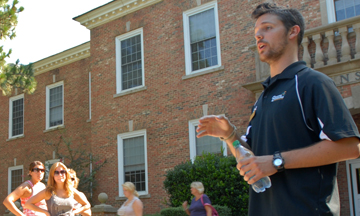
 ROCK HILL—The college years are crucial for developing the next generation of energized, informed Catholics.
ROCK HILL—The college years are crucial for developing the next generation of energized, informed Catholics.
That can only happen through a combination of good liturgy, exposure to the sacraments, education and a commitment to community and service, according to Father Jim Bacik, a nationally known theologian and campus minister.
At a meeting with diocesan campus ministers at The Oratory recently, Father Bacik said effective campus ministry on a secular campus requires equal involvement among students, advisors, Catholic faculty, and local clergy.
“In the big picture, we have to help collegians become more committed and knowledgeable disciples of Christ,” he said. “We need to help form them in their faith, appreciate and understand our great tradition, and show how the tradition will help them live better lives.”
Father Bacik was the writer for the committee that produced the U.S. Conference of Catholic Bishops’ pastoral letter on campus ministry, “Empowered by the Spirit” in 1985.
“Faith will help them have better marriages, find more meaning in work, be better citizens and more able to work for peace and justice. To do that, we have to immerse them in a Christian community on campus,” Father Bacik said.
The message of faith can get lost in the bustle of college life, at a time when students need it more than ever as they face choices about time management, values and morality, and are exposed to an increasingly secular, atheistic and individualistic culture, he explained.
The disturbingly promiscuous “hook-up” culture on many campuses offers a perfect opportunity for Catholic campus ministry to make a difference in students’ lives.
“If we show them the wisdom and value of church teaching, we offer them a wisdom that can help guide them toward sexual maturity,” said Father Bacik, who is a campus minister at the University of Toledo in Ohio.
On many campuses, especially in the Southeast, a concern is keeping students committed to the faith in the face of sometimes aggressive recruitment from evangelical groups.
Melissa Parker, who works in campus ministry at Winthrop University in Rock Hill, is familiar with that challenge.
“We find ourselves competing with other campus ministries to get students to our events,” she said. “That can be hard when they have more money and flashier events that attract several hundred people.”
Exposing students to the rich Catholic intellectual tradition and reaching out to answer their questions about theology and doctrine can go a long way toward keeping them in the fold, Father Bacik said.
He encourages campus ministers to hold regular Bible study and faith-sharing groups, and offer programs that address issues such as money management, relationships and marriage preparation.
When possible, he urges them to work for a more extensive Catholic presence on the campus at large, through lecture series, encouraging Catholic faculty to work with students and discuss their faith, and even the establishment of special chairs in Catholic studies.
Discussions on theology and doctrine have been effective at Francis Marion University in Florence, said campus ministry advisor Yulaundra Heyward.
Father John Zimmerman, pastor of St. Anne Church, visits often to answer questions during their meetings.
“We have a lot of students from areas without a lot of Catholics, and they’re interested in learning more about their faith and how to answer the different questions we always hear, like ‘Do you worship Mary?’” Heyward said.
Competing with busy calendars is one of the biggest challenges for campus ministers, said Brian Goess, faculty advisor for Catholic ministry at Furman University in Greenville.
“Students as a whole tend to be overcommitted, and you need to find a way to make Catholic campus ministry shine among all the commitments and distractions,” Goess said.
For international students, a Catholic presence can be a source of comfort and spiritual nourishment, said Carrie Houser James, who coordinates campus ministry at Claflin and South Carolina State universities in Orangeburg, with fellow volunteer Charles Guess.
“Many of our Catholic students come from Africa or the Caribbean, and they’re facing a new cultural experience as well as the new experience of college,” she said. “Our biggest challenge is to help them build that bridge and make the transition as easy as possible. We become almost like their parents away from home.”
Despite the obstacles and challenges, Father Bacik said he is optimistic about the future of campus ministry.
This generation of Catholic college students, he said, has grown up with a real sense of their role in the church, their community and the world outside the campus walls.
“Many of these students have a sense of ‘we are the church’ and are co-responsible for it. They understand the importance of religious liberty and good choices, and realize the liturgy is public worship and not just private meditation,” he said.
